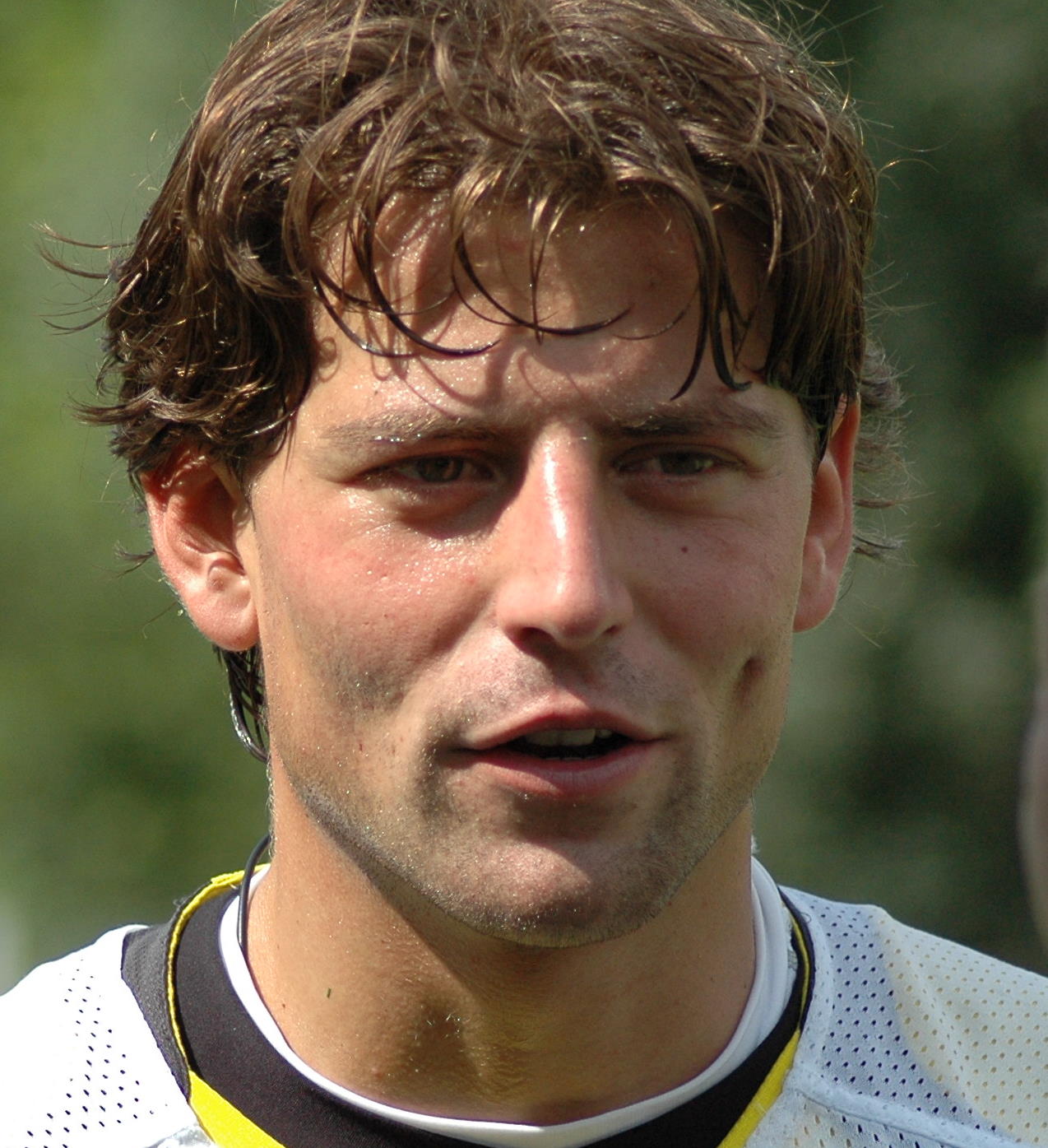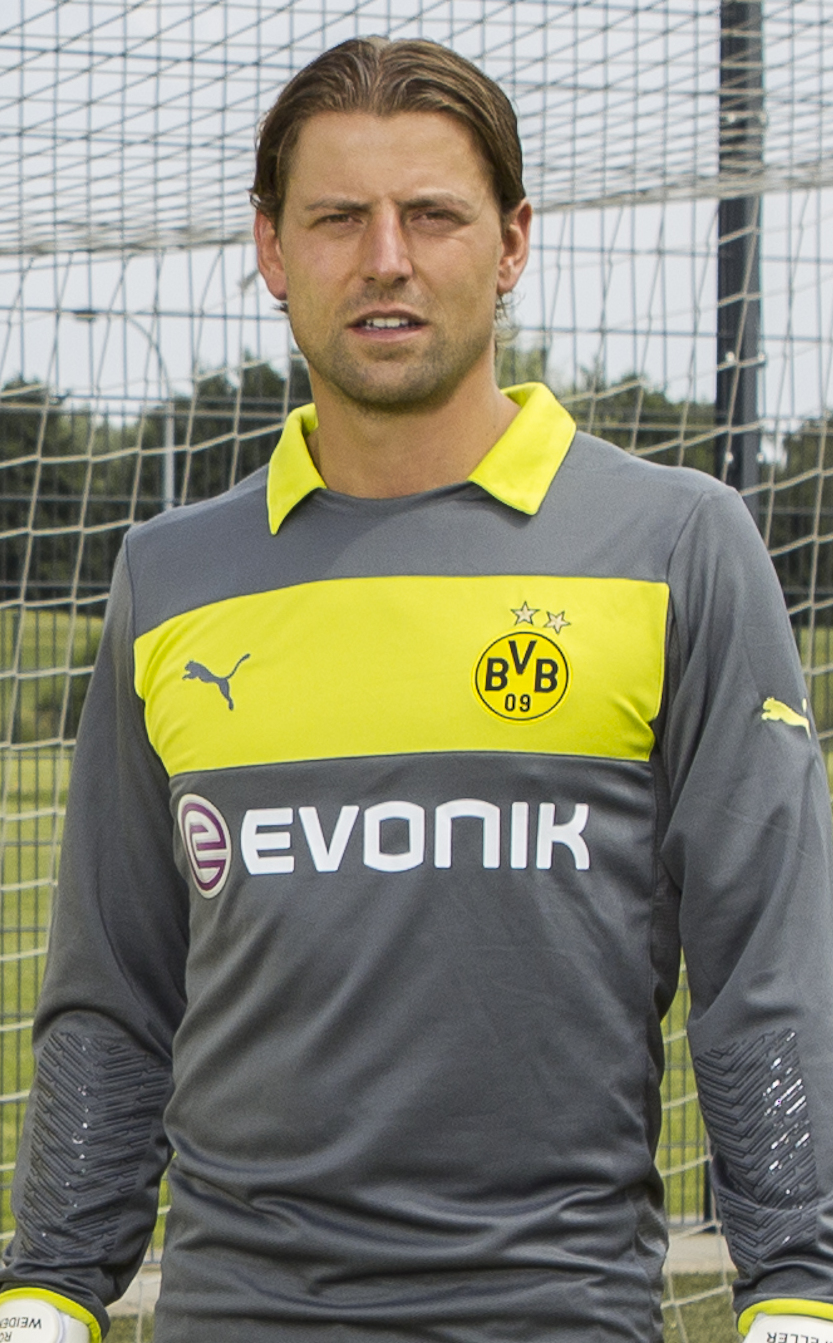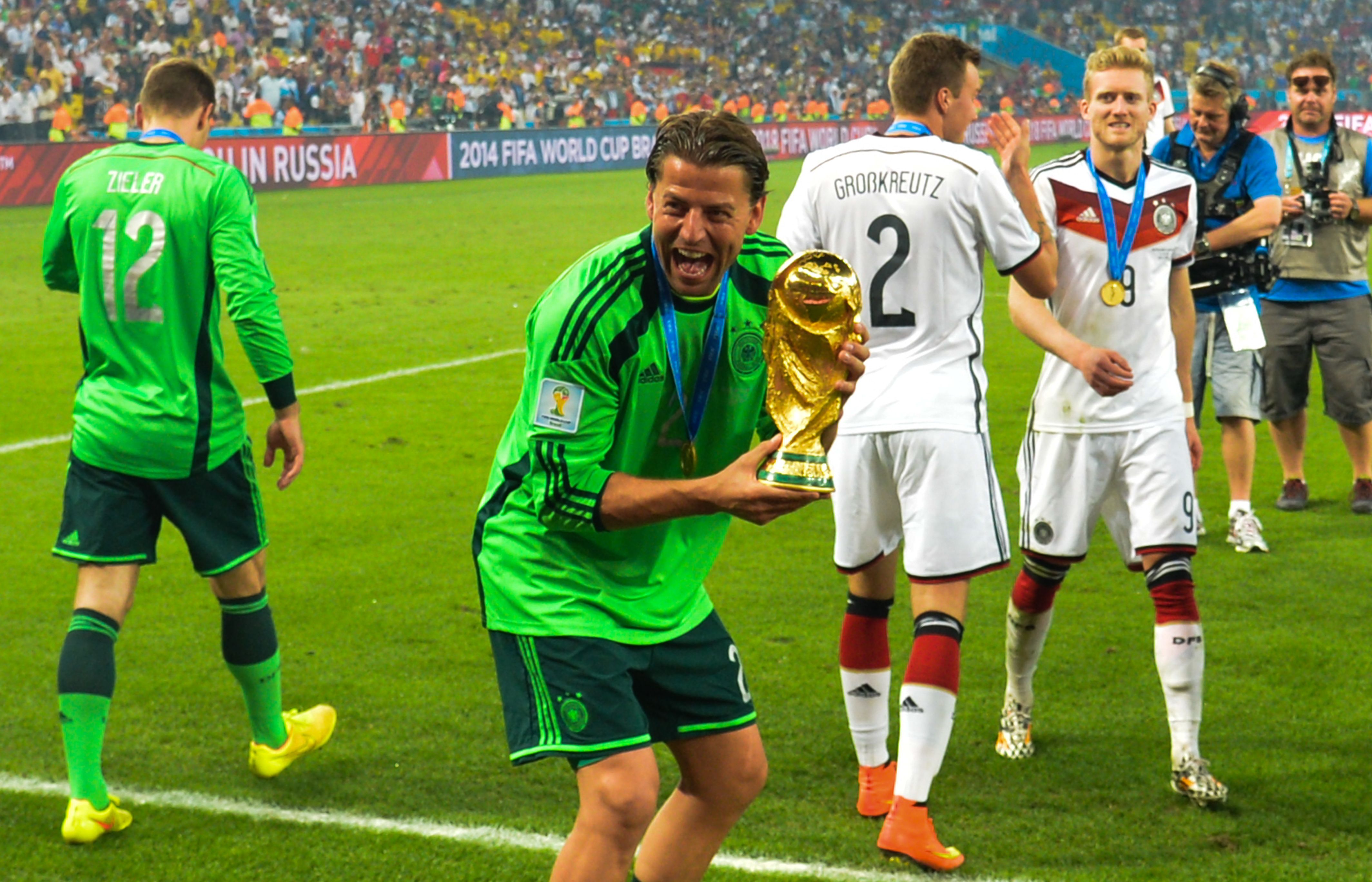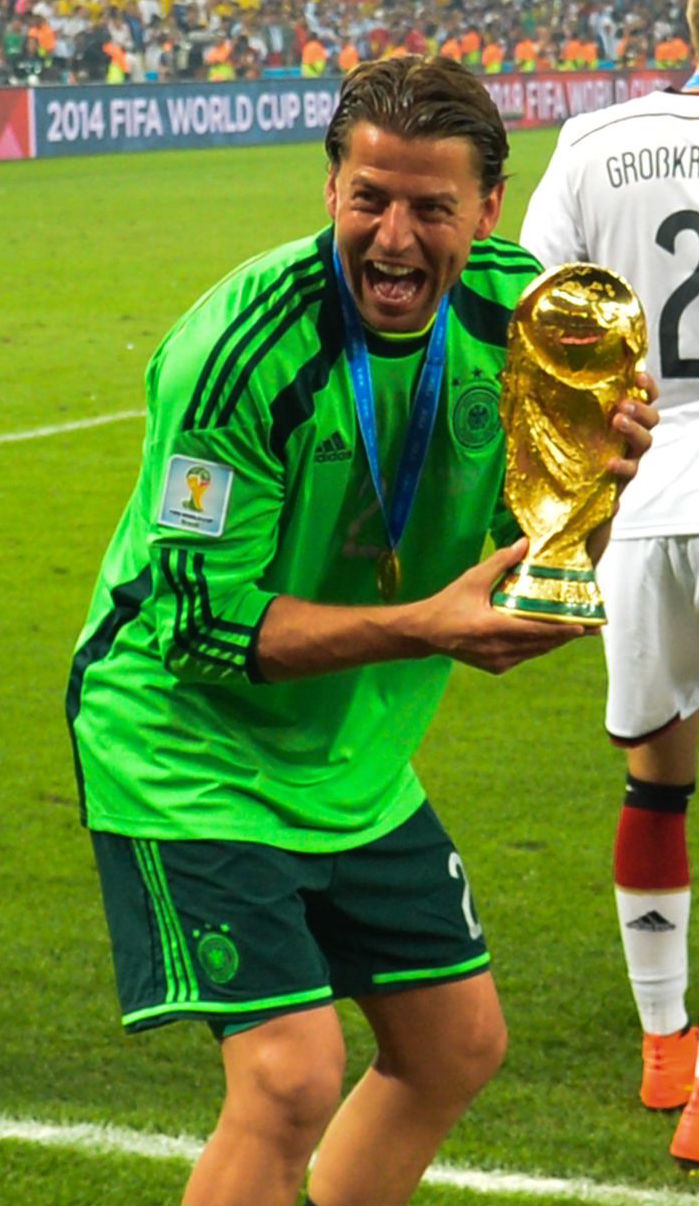1. Early life and youth career
Roman Weidenfeller was born on August 6, 1980, in Diez, West Germany, a town located in the state of Rhineland-Palatinate. His early football development began in 1985 at the youth academy of Sportfreunde Eisbachtal, where he played until 1997. In 1996, he transitioned to the youth system of 1. FC Kaiserslautern.
Weidenfeller made his professional debut in 1997, largely due to his impressive performances at the 1997 FIFA U-17 World Championship. As a member of the German U-17 national team, he participated in 8 matches and helped lead Germany to the semifinals of the tournament. Despite his team's eventual fourth-place finish, Weidenfeller was recognized as the best goalkeeper of the tournament, an achievement that further solidified his place in Kaiserslautern's youth setup. Earlier in 1997, he also made an appearance for the German U-16 national team and contributed to their bronze medal finish at the UEFA European Under-16 Championship.
2. Club career
Weidenfeller's professional club career primarily centered on his extensive and highly successful period at Borussia Dortmund, following his foundational years at 1. FC Kaiserslautern.
2.1. 1. FC Kaiserslautern
After joining the youth team in 1996, Weidenfeller spent time playing for the second team of 1. FC Kaiserslautern, where he accumulated 51 appearances over three seasons, from 1998 to 2002. He was promoted to the first team in 1999 for the 2000-01 season. However, his opportunities with the senior squad were limited; across two seasons (2000-01 and 2001-02), he made only six league appearances, totaling eight official matches. During this period, he also made one appearance in the UEFA Cup.
2.2. Borussia Dortmund

In 2002, Weidenfeller made a significant move to Borussia Dortmund, then the German champions, on a free transfer. This transfer positioned him as a potential replacement for Dortmund's established first-choice goalkeeper, Jens Lehmann, who would depart for Arsenal in 2003. Weidenfeller had reportedly been dissatisfied with his backup role at Kaiserslautern, where he primarily served as an understudy to Georg Koch. His debut for Borussia Dortmund occurred on December 17, 2003, in a match against his former club, Kaiserslautern, which Dortmund lost 1-0. Following Lehmann's move, Weidenfeller formally stepped into the role of the club's primary goalkeeper.
2.2.1. Rise to prominence and championships
Weidenfeller quickly established himself as a consistently stable and reliable goalkeeper for Borussia Dortmund, earning a reputation for his strong performances and excellent ability to save penalties. He played an instrumental role in the club's resurgence under manager Jürgen Klopp.
His contributions led to remarkable success, with Dortmund winning the Bundesliga in two consecutive seasons: 2010-11 and 2011-12. In the decisive 2011-12 Bundesliga match, he notably saved a penalty from Arjen Robben, helping secure the title. This historic season also saw Dortmund achieve a domestic double by winning the DFB-Pokal in 2012. During the 2012 DFB-Pokal Final, Weidenfeller was substituted in the 33rd minute after a collision with Mario Gómez; his team ultimately defeated Bayern Munich 5-2. On July 27, 2013, he further contributed to Dortmund's trophy cabinet by winning the 2013 DFL-Supercup with a 4-2 victory against rivals Bayern Munich.

Throughout his extensive tenure at Dortmund, Weidenfeller also helped the club achieve numerous other notable results. These included three Bundesliga runner-up finishes (in the 2012-13, 2013-14, and 2015-16 seasons) and two third-place finishes (in 2002-03 and 2016-17). He also reached the DFB-Pokal final on four additional occasions (in 2007-08, 2013-14, 2014-15, and 2015-16), was a runner-up in the 2003 DFB-Ligapokal, and finished as a runner-up in the DFL-Supercup four times (in 2011, 2012, 2016, and 2017). A major highlight of his career was reaching the UEFA Champions League final in 2013, although Dortmund ultimately finished as runners-up to Bayern Munich.
2.2.2. Injury and controversy
Weidenfeller's playing career was not without significant challenges, including notable injuries and a well-publicized controversy. In 2005, he underwent surgery to repair a meniscus tear in his left knee, an injury sustained during a training session, which sidelined him for several months.
A more significant incident occurred early in the 2007-08 season. In August 2007, the German Football Federation imposed a three-match ban and a fine of 10.00 K EUR on Weidenfeller for racist insults he directed at FC Schalke 04 striker Gerald Asamoah. The incident took place during a match on August 18, 2007, following a confrontation between the two players in the 51st minute. While Weidenfeller later issued an apology to Asamoah in response to media reports, he maintained that he had not made the specific racist statement attributed to him. This event drew attention to the issue of racism in football and resulted in disciplinary action against him. Later that same season, he was unable to participate in the 2008 DFB-Pokal Final due to a partial tear of the medial ligament in his right knee, with Marc Ziegler stepping in as his replacement in a match Dortmund lost 2-1 to Bayern Munich.
2.2.3. Later career and retirement
On May 6, 2013, Weidenfeller extended his contract with Borussia Dortmund, committing to the club until 2016. However, following the departure of manager Jürgen Klopp at the close of the 2014-15 season, new manager Thomas Tuchel opted to name recently signed Roman Bürki as the first-choice goalkeeper. Despite this change, Weidenfeller continued to feature prominently in the club's European matches.
Weidenfeller demonstrated his continued loyalty to Dortmund by signing another one-year deal in February 2016, extending his stay until 2017, and then a further extension until 2018 in May 2017. At the conclusion of the 2017-18 season, having made 453 official appearances for the club, conceding 510 goals and keeping 148 clean sheets, Roman Weidenfeller officially retired from professional football. His final professional appearance was as a substitute for Bürki. His retirement was commemorated with a farewell match on September 7, 2018, held at Signal Iduna Park (Westfalenstadion), where a team dubbed "Roman & Friends" played against "BVB All Stars." Weidenfeller notably scored two goals during this celebratory match.
3. International career
Roman Weidenfeller represented the German national team at various levels throughout his career, eventually earning caps for the senior squad after a prolonged wait.
3.1. Youth national teams
Weidenfeller's international career began with Germany's youth teams. In addition to his notable performances at the 1997 FIFA U-17 World Championship and the 1997 UEFA European Under-16 Championship, he played three matches for the national under-21 team between 1999 and 2001. In 2005, he earned one cap for the B-national team of Germany, a developmental squad informally known as "Team 2006," created to prepare players for the 2006 FIFA World Cup. Despite his involvement in this program, he was not selected by Jürgen Klinsmann for the final squad for the 2006 World Cup, which was hosted on home soil.
3.2. Senior national team

Weidenfeller's call-up to the senior Germany national football team came relatively late in his career. In November 2013, at 33 years old, he was selected for the first time for friendly matches against Italy and England. He earned his first cap on November 19, 2013, starting against England at Wembley Stadium, making him the oldest ever German goalkeeper debutant. He impressively kept a clean sheet in this match, contributing to Germany's 1-0 victory.

He continued to make appearances in international friendlies, including a 2-2 draw against Cameroon and a 6-1 victory over Armenia. Based on his strong performances, particularly in the 2012-13 season, he was included in Germany's squad for the 2014 FIFA World Cup in Brazil. Although he served as a reserve goalkeeper behind Manuel Neuer and did not play in any matches during the tournament, he was part of the German team that won the World Cup title for the fourth time, marking his first major international trophy.
Following the World Cup, he played in a friendly match against Argentina. Weidenfeller continued to be named in the squad for UEFA Euro 2016 qualifying matches but consistently remained second choice to Neuer. His final international appearance came in June 2015, when he played a full match against Gibraltar during the UEFA Euro 2016 qualifiers. This match marked his fifth and final cap for the senior national team before he announced his retirement from international football.
4. Career statistics
| Club | Season | League | Cup | Europe | Other | Total | ||||||
|---|---|---|---|---|---|---|---|---|---|---|---|---|
| Apps | Goals | Apps | Goals | Apps | Goals | Apps | Goals | Apps | Goals | |||
| 1. FC Kaiserslautern II | 1998-99 | 4 | 0 | - | - | - | 4 | 0 | ||||
| 1999-2000 | 35 | 0 | - | - | - | 35 | 0 | |||||
| 2001-02 | 12 | 0 | - | - | - | 12 | 0 | |||||
| Total | 51 | 0 | 0 | 0 | 0 | 0 | 0 | 0 | 51 | 0 | ||
| 1. FC Kaiserslautern | 2000-01 | 3 | 0 | 0 | 0 | 1 | 0 | - | 4 | 0 | ||
| 2001-02 | 3 | 0 | 1 | 0 | - | - | 4 | 0 | ||||
| Total | 6 | 0 | 1 | 0 | 1 | 0 | 0 | 0 | 8 | 0 | ||
| Borussia Dortmund II | 2002-03 | 7 | 0 | - | - | - | 7 | 0 | ||||
| 2003-04 | 4 | 0 | - | - | - | 4 | 0 | |||||
| 2004-05 | 2 | 0 | - | - | - | 2 | 0 | |||||
| Total | 13 | 0 | 0 | 0 | 0 | 0 | 0 | 0 | 13 | 0 | ||
| Borussia Dortmund | 2002-03 | 11 | 0 | 2 | 0 | - | 1 | 0 | 14 | 0 | ||
| 2003-04 | 17 | 0 | 2 | 0 | 6 | 0 | 2 | 0 | 27 | 0 | ||
| 2004-05 | 26 | 0 | 1 | 0 | - | - | 27 | 0 | ||||
| 2005-06 | 24 | 0 | 1 | 0 | 2 | 0 | - | 27 | 0 | |||
| 2006-07 | 34 | 0 | 2 | 0 | - | - | 36 | 0 | ||||
| 2007-08 | 14 | 0 | 0 | 0 | - | - | 14 | 0 | ||||
| 2008-09 | 32 | 0 | 3 | 0 | 2 | 0 | - | 37 | 0 | |||
| 2009-10 | 30 | 0 | 3 | 0 | - | - | 33 | 0 | ||||
| 2010-11 | 33 | 0 | 2 | 0 | 8 | 0 | - | 43 | 0 | |||
| 2011-12 | 32 | 0 | 4 | 0 | 6 | 0 | 1 | 0 | 43 | 0 | ||
| 2012-13 | 31 | 0 | 5 | 0 | 13 | 0 | 1 | 0 | 49 | 0 | ||
| 2013-14 | 30 | 0 | 4 | 0 | 9 | 0 | 1 | 0 | 43 | 0 | ||
| 2014-15 | 25 | 0 | 0 | 0 | 7 | 0 | - | 32 | 0 | |||
| 2015-16 | 1 | 0 | 0 | 0 | 13 | 0 | - | 14 | 0 | |||
| 2016-17 | 7 | 0 | 2 | 0 | 2 | 0 | 0 | 0 | 11 | 0 | ||
| 2017-18 | 2 | 0 | 0 | 0 | 1 | 0 | 0 | 0 | 3 | 0 | ||
| Total | 349 | 0 | 29 | 0 | 69 | 0 | 6 | 0 | 453 | 0 | ||
| Career total | 419 | 0 | 30 | 0 | 70 | 0 | 6 | 0 | 525 | 0 | ||
Notes: The "Cup" column includes appearances in the DFB-Pokal. The "Europe" column includes appearances in the UEFA Champions League, UEFA Cup, and UEFA Europa League. The "Other" column includes appearances in the DFB-Ligapokal and DFL-Supercup.
| National team | Year | Apps | Goals |
|---|---|---|---|
| Germany | 2013 | 1 | 0 |
| 2014 | 3 | 0 | |
| 2015 | 1 | 0 | |
| Total | 5 | 0 | |
5. Honours
Roman Weidenfeller's career was decorated with numerous titles and significant achievements at both club and international levels.
Borussia Dortmund
- Bundesliga:
- Winner: 2010-11, 2011-12
- Runner-up: 2012-13, 2013-14, 2015-16
- DFB-Pokal:
- Winner: 2012, 2017
- Runner-up: 2008, 2014, 2015, 2016
- German Supercup:
- Winner: 2008 (T-Home Supercup), 2013 (DFL-Supercup)
- Runner-up: 2011, 2012, 2016, 2017
- UEFA Champions League:
- Runner-up: 2013
- DFB-Ligapokal:
- Runner-up: 2003
Germany U16
- UEFA European Under-16 Championship:
- Bronze: 1997
Germany
- FIFA World Cup:
- Winner: 2014
6. Post-retirement activities and legacy
Following his retirement from professional football at the end of the 2017-18 season, Roman Weidenfeller chose to remain closely associated with Borussia Dortmund. He transitioned into a new role as an international ambassador for the club, undertaking his first trip in this capacity shortly after his retirement. In this position, Weidenfeller represents Borussia Dortmund globally, promoting the club's brand and values. His legacy at Dortmund is significant, marked by his long tenure of 16 seasons, his consistent performance as a key goalkeeper, and his vital role in the club's successful period, which included two Bundesliga titles and two DFB-Pokal wins. He is widely regarded as a franchise star for the club.